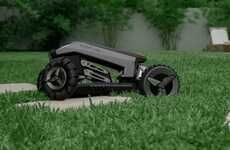Pollination is a key act of nature that allows crops to grow and flourish, but as more and more bee colonies perish, it may be time we consider a pollination robot. Developed and constructed at West Virginia University, this pollination robot blends together ground robot technology, computer vision and complex algorithms to serve as a solution to the possible extinction of pollinating bees. The robot was designed alongside entomologists and horticulturalists to ensure the robot is perfect for pollination and can one day operate outside of a greenhouse.
The key to the robot lies in its robotic arm, which comes equipped with a set of soft brush tips designed to act like the hairs on bees. This fine brush allows the robot to collect pollen in a similar manner to bees and was inspired when the lead developer, Yu Gu, observed bees pollinating his neighbor's plants. The pollination robot is still in development, and is far from ready to use, but it shows a possible solution to pollination through man-made means.
Mechanical Pollination Solutions
A Pollination Robot May be the Solution to a Bee-Less World
Trend Themes
1. Mechanical-pollination-robots - Developing and implementing mechanical pollination robots can provide an alternative solution to preserve crop growth in the absence of bees.
2. Ground-robot-technology - Utilizing ground robot technology, such as computer vision and complex algorithms, can enhance the effectiveness and efficiency of mechanical pollination robots.
3. Bee-extinction-concerns - The possible extinction of pollinating bees highlights the urgent need to explore and invest in alternative pollination methods, such as pollination robots.
Industry Implications
1. Agriculture - The agriculture industry could benefit from incorporating mechanical pollination robots to ensure crop production and mitigate the impact of declining bee populations.
2. Robotics - The robotics industry has the potential to grow by developing sophisticated mechanical pollination robots that mimic the pollination capabilities of bees.
3. Environmental Conservation - The environmental conservation industry can leverage the use of mechanical pollination robots as a proactive measure to help mitigate the decline of pollinating bee populations.






